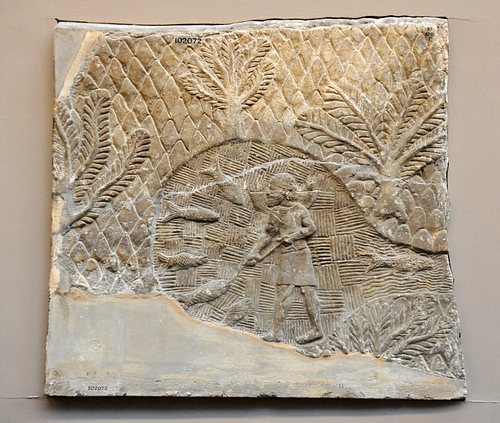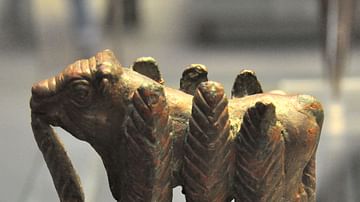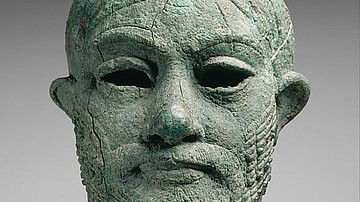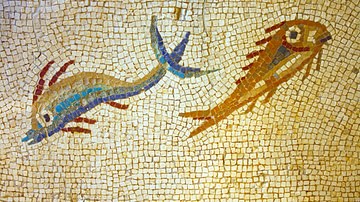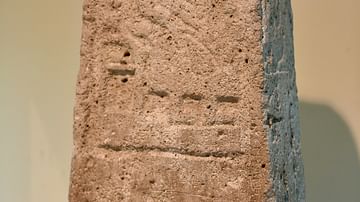The Home of the Fish is a Sumerian poetic monologue, most likely from the Ur III Period (2047-1750 BCE), in which the speaker tries to coax various fish into a newly built home. The meaning of the poem depends on whether the speaker is sincere in his or her invitation or has actually built a trap.
According to some interpretations (including that of scholar Jeremy Black), the speaker is a fisherman who has constructed an elaborate trap he then tries to entice the fish to enter. This interpretation casts all the praises of the speaker in a sinister light as they are only being used to lure the fish into the trap. Another interpretation, however, gives the speaker as Nanshe, the Sumerian goddess of social justice and divination, who also presided over water and aquatic life. The fish, in fact, was one of her symbols. If the speaker is Nanshe, she is sincere in her praise of the fish and her welcome to the home she has created for them.
Both interpretations cite the final line of the work – "Just you come to me! Nanshe, the queen of the fishermen, will be delighted with you" (C17) – in support. If the speaker is a fisherman, Nanshe would be invoked in her capacity as his patron goddess – who cared for those who caught fish as well as the fish themselves – and, if the speaker is Nanshe, it would not be unusual for the goddess to refer to herself in the third person as this is quite common in Sumerian poetry. The goddess Inanna, for example (Nanshe's sister), refers to herself in this same way in some works.
It is up to a reader to decide who is speaking and what their intentions are, but both interpretations, relying on the same words, can be equally valid. The work was part of the curriculum of the edubba ("House of Tablets"), the Sumerian scribal school and would have been used to help students memorize the names of different fish and their defining characteristics. The poem is among the more popular works of Mesopotamian literature today and seems to have also been in its time based on the number of fragments discovered, beginning in the 19th century, in the ruins of ancient cities throughout Iraq.
Commentary & Summary
The poem was most likely composed around the same time – c. 2000 BCE – as The Debate Between Bird and Fish, The Debate Between Sheep and Grain, and the other literary debates which were popular during the Ur III Period. Shulgi of Ur (r. 2029-1982 BCE) made literacy a priority in his kingdom and so established more scribal schools and commissioned more works for the curriculum. Scribes in ancient Mesopotamia learned their craft from a young age (possibly beginning at eight years old) through their early twenties, progressing from simple to more difficult compositions. The Home of the Fish would have most likely been included in the texts toward the end of a student's education when one was expected to be able to memorize and copy intricate works.
This probability is suggested by the names of the fish and their characteristics that appear throughout as scribes were expected to be well educated in all disciplines. Black writes:
Many different kinds [of fish] are specified and are described in vivid and probably humorous terms. Mostly the varieties cannot be securely identified with modern species, so here their names are left in Sumerian. There is an intimate lexical relationship between the names of the fish enumerated here and those in the traditional list of fish, one among the many word lists which had been learnt for centuries by apprentice scribes in Mesopotamian schools. This strongly suggests that the composition had been adapted for school use by incorporating extra pedagogical material. (240)
The poem, if the speaker is understood as Nanshe, would have also underscored the goddess' care for the creatures of the waters of Mesopotamia as she has built them a new home where they will be safe from predators and could therefore be considered a song of praise. If the speaker is a fisherman, the work would still function as a praise song, as Nanshe would have inspired the fisherman to create his elaborate trap.
The poem begins with the speaker announcing a "new home" for the fish, and throughout Segment A, it is described as a place of safety to which all fish should come quickly. The house is described as a haven to which all are welcome – in keeping with Nanshe's role as a protectress of refugees and the homeless – and the fish are encouraged to bring all their friends and neighbors. Lines A45-67 reference Dumuzid and Acimbabbar Suen – a fertility/underworld god and the moon god, respectively – both having to do with transformation. The earlier lines (A25-33) encouraging the fish to enter quickly before the night comes, in some interpretations, may be referencing stability (the house) in the face of change (the water) – the concept of transformation from the world of mutability to that of unchanging eternity.
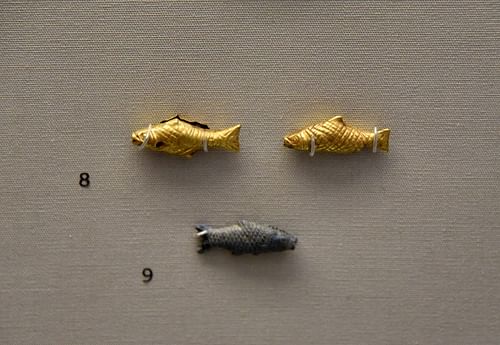
In Segments B and C, the speaker notes how, in this new home, the fish will be safe from birds who carry them off in their claws, and the work concludes with a call to hurry because "time is pressing" before ending with the ambiguous line, "Nanshe, the queen of fishermen, will be delighted with you", the pivotal line in interpreting who is speaking and what their intention might actually be.
Text
The following is taken from The Literature of Ancient Sumer, translated by Jeremy Black et al., and from The Electronic Text Corpus of Sumerian Literature, translated by the same. Ellipses indicate missing words or lines and question marks an alternate translation for a word.
SEGMENT A
A1-13: My fish, I have built you a home! My fish, I have built you a house, I have built you a store! I have built you a house bigger than a house, in fact a large sheepfold. Inside there is incense, and I have covered it with cloths for you; in this happy place, I ... water of joy for you; a house not bothered by cords dividing the plots, ... in the gutters. In the house, there is food, food of the best quality. In the house, there is food, food in good condition. No flies buzz around in your house where beer is poured out. Your reputation ... cannot be alienated (?). The threshold and the door-bolt, the ritual flour and the incense-burner are all in place. The scent and fragrance in the house are like an aromatic cedar forest. In the house, there is beer, there is good beer. There is sweet beer, and honeyed cakes, extending as far as the reed fence.
A14-24: Let your acquaintances come! Let your dear ones come! Let your father and grandfather come! Let the sons of your elder brother and the sons of your younger brother come! Let your little ones come, and your big ones too! Let your wife and your children come! Let your friends and companions come! Let your brother-in-law and your father-in-law come! Let the crowd by the side of your front door come! Don't leave your friends' children outside! Don't leave your neighbors outside, whoever they may be!
A25-33: Enter, my beloved son! Enter, my fine son! Don't let the day go by, don't let the night come! The moonlight should not enter that house! But if the day has gone by and the night comes, enter and I will let you relax there; I have made the grounds suitable for you! Inside, I have fixed up a seat for you. My fish, no one who sleeps there will be disturbed; no one who sits there will get involved in a quarrel.
A34-39: Enter, my beloved son! Enter, my fine son! As if you were in a river with brackish water, don't go investigating any canals! As if you were in silt settled on the riverbed, may you not be able to get up! As if you were in flowing water, you should not fix your bed! The moonlight should not enter that house!
A40-44: And may you not succeed in getting away: face towards me! And may you not succeed in getting away like a ... to your lair: face towards me! And may you not succeed in getting away like a dog to where you go sniffing: face towards me! And may you not succeed in getting away like a ... to where you ...: face towards me! And may you not succeed in getting away like a bull to your cattle-pen, like a sheep to your sheepfold: face towards me!
A45-67: Now, just ...... like a bull to your cattle-pen! Enter for me, and Suen will be delighted with you! Now, just ... like a sheep to your sheepfold! Enter for me, and Dumuzid will be delighted with you! When you lift your head like a bull towards your cattle-pen, Lord Acimbabbar Suen will be delighted with you! When you raise your head like a sheep in the sheepfold, Dumuzid the shepherd will be delighted with you!
15 lines fragmentary or missingA68-80: The fish who ... May all kinds of fishes also enter with you, my fish! The one with handsome barbels who eats the honey plant, my suhur-gal fish: may he also enter with you, my fish! The one who always eats ... reeds, ..., my suhur-tur fish: may he also enter with you, my fish! The one with big lips, who sucks the gizi reeds,
1 line fragmentary
whose food ..., my ectub fish: may he also enter with you, my fish! The black punting-pole, engendered in the fields, the farrowing sow who takes away the dough from the river banks, my gubi fish (probably = eel) : may he also enter with you, my fish!A81-95: The one with a spiny (?) tail and a spiny (?) back, who goes ..., my ce-suhur-gal (?) fish: may he also enter with you, my fish! The fish who is like a crying child in its prayers, my ce-suhur-sig (?) fish: may he also enter with you, my fish! With a pickaxe as a head, and having a comb for teeth, the branches of a fir-tree as its bones, Dumuzid's water-skin for the skin of its bladder (?), with a dehaired skin that does not need processing, with its slender tail like the fishermen's whip, the jumping fish, with naturally smoothed skin, with no entrails in its nose, the fish who seizes adversaries by arms and legs, whose sting goes across like a nail, which is taboo and is not placed as an offering in the city's shrines, my mur fish (= sting-ray) : may he also enter with you, my fish!
A96-113: The one whose fins (?) churn the troubled waters, a fish who seizes ... at a glance (?), my kij fish: may he also enter with you, my fish! With a head like a small millstone, ... a dog's head,
1 line unclear
the fish who does not eat the ... plants, ..., my jir-gid fish: may he also enter with you, my fish! With the noise of his entrails ..., my gir fish: may he also enter with you, my fish! The fish who ..., the fish who knows how to escape through a reed barrier, the fish which despite being tasty is an abomination, my ab-suhur fish: may he also enter with you, my fish! The fish that causes breaches in dykes, with venom in its jaws, my agargar fish: may he also enter with you, my fish! The one whom the merchants ..., my kamar fish: may he also enter with you, my fish! The one whom the Martu fetch away, my nunbar-gid (?) fish: may he also enter with you, my fish!A114-117: The fish who does not eat edible plants, ..., my azagur fish: may he also enter with you, my fish! The one that ... a heavy skin, ..., my muc fish: may he also enter with you, my fish!
approx. 7 lines fragmentary or missingSEGMENT B
B1-7: ..., spotted (?) ..., my jiru (?) fish: may he also enter with you, my fish! The one that the children bring in ..., my salsal fish: may he also enter with you, my fish! The one with snake's eyes, a ... mouse's mouth, who ... on riverbanks,
approx. 8 lines fragmentary or missingSEGMENT C
C1-12: The one who utters its sinister cry in the marshes and rivers, my agane bird: you would be dangling from its claws, my fish! The one who circles the nets looking for you in the waters where the nets are stretched, my ubure bird: you would be dangling from its claws, my fish! The one with long legs, that laughs, the alien from faraway waters, that writes in the mud, my ance-bar (?) bird: you would be dangling from its claws, my fish! The one who does not adorn ..., with the ... of a bird and webbed (?) feet, my kib bird: you would be dangling from its claws, my fish! The one who seizes the quadrupeds that wander into the marshes, my kuda crocodile: you would be dangling from its claws, my fish!
C13-17: But you won't be dangling from their claws, you won't be snatched up by their feet! Time is pressing, my fish! Just you come to me! Time is pressing! Just you come to me! Nanshe, the queen of the fishermen, will be delighted with you.
Conclusion
Jeremy Black, as noted, concludes that the speaker is insincere throughout. He is only flattering the fish to trap them:
The fisherman addresses the fish exactly as if they were humans, and describes the trap as if it were a welcoming human house, into which he tries to lure the fish … Finally, the fisherman suggests to the fish that they would actually be safer in the `home' he has built for them as, if they remain in the river, they are in constant danger of being snatched up in the claws of any of one of several predatory birds. And, by entering the trap, they will actually give pleasure to Nanshe, the goddess of fish and fishermen. (240)
Scholar Samuel Noah Kramer, however, representing the opposite interpretation, claims the poem celebrates "the first aquarium" in the world. The fish are being brought to a new home where they will be safe and will, therefore, delight Nanshe:
The entire text of our "aquarium" composition consists of an address purported to be uttered by some individual who, for one reason or another, was an ardent lover of fish. It begins with a reassuring announcement that the speaker has built a house for the fish, large, spacious, and unapproachable, and provided it with fine food and drink, especially beer and sweet cookies. (History, 348)
In Kramer's view, the Sumerians had created the first aquarium – possibly in honor of Nanshe – and the poem is an ode to its magnificence as a home where all different fish will live together in safety and peace. A third possible interpretation, however, is that the poem works on both a literal and symbolic level. The fish are actual fish which the Sumerians would have recognized, but, possibly, each of these fish had some symbolic meaning for them now lost linking them to social classes. In this interpretation, Nanshe – primarily the goddess of social justice – is welcoming all those who have been disenfranchised, as well as those in power, to live together in peace and harmony in the home she has made for them.

